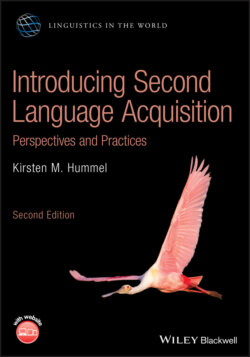Читать книгу Introducing Second Language Acquisition - Kirsten M. Hummel - Страница 23
2.4.1 behaviorist view
ОглавлениеB. F. Skinner (1904–1990), an American psychologist, was perhaps the best known proponent of an extreme empiricist, or behaviorist, view of language acquisition, known as behaviorism. He viewed the child as a passive recipient, subjected to environmental influences. In this view, language was considered as “verbal behavior,” and only what was observable and measurable was accepted as a means to evaluate language acquisition; no attempt was made to hypothesize about non‐perceptible mental events. Behaviorists such as Skinner explained vocabulary comprehension through “classical conditioning,” or the pairing of a stimulus and a response. In concrete terms, Skinner proposed that when an infant hears the word “milk” on receiving his bottle, he comes to associate the word “milk” with that nutritive substance. Along the same lines, productive vocabulary is explained by “operant conditioning”: when the child utters a word that produces the desired effect, then the child is more likely to reproduce that word and, in contrast, words that do not trigger hoped‐for responses tend to disappear. For example, if a child says “mama” in the mother's presence, the child is reinforced by receiving the desired attention. On the other hand, if the child says “mama” when the mother is not present, the link between the word and its referent is not reinforced. Eventually the child's mother becomes the stimulus evoking the response “mama,” such that a bond is established between the mother and the word “mama.” This approach also anticipates a role for direct imitation. Imitation is considered to be self‐reinforcing, and allows a shortcut so that tedious shaping of each verbal response is not necessary.
behaviorism
Theoretical view proposing that learning principles can explain most behavior, and observable events, rather than mental activity, are the proper objects of study.
While the behaviorist view of language acquisition had considerable impact on the field, it was sharply criticized by researchers, in particular linguists, who, by the late 1950s, had come to very different conclusions about the language acquisition process. Most notably, Chomsky (1959, p. 42) wrote a strongly worded critique of Skinner's book Verbal Behavior in which he argued: “I have been able to find no support whatsoever for the doctrine … that slow and careful shaping of verbal behavior through differential reinforcement is an absolute necessity.” In fact, most research studies have reported that there is little evidence of direct reinforcement of children's utterances. Further, linguists point out that imitation accounts for little syntactic learning and, in any case, is infrequent beyond age two. In addition, children produce forms like “goed” and “wented,” which they do not hear in the environment. Also, importantly, the behaviorist view fails to explain creativity, the fact that children produce novel utterances, like “the paper is soaky” (for “soaking wet,” see Clark 1993) that do not resemble utterances they hear in their environment.
